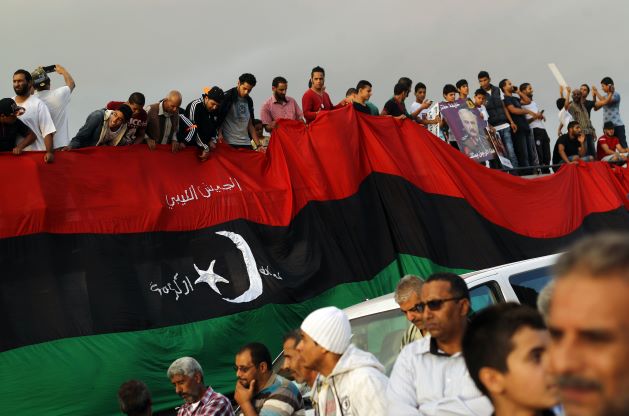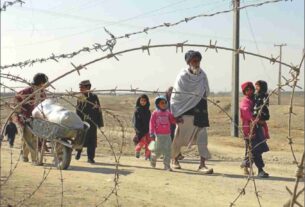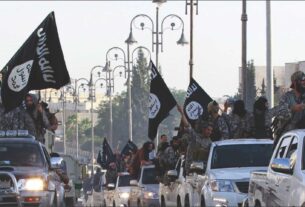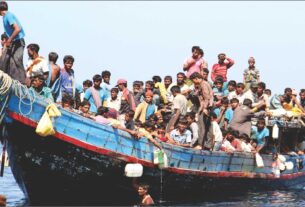Libya turning into a failed state again
Libya is again turning into a failed state and rule of law may evade the tiny North African nation for another decade or so as hundreds of Islamic fighters are entering into the country without any verification.
Indeed, it is far from surprising that Libya is still ravaged by violence. The country has been a failing state since its revolution in 2011. It was long host to two rival governments, one based in Tripoli consisting of Islamic hardliners, and a more moderate one based in the eastern city of Tobruk, comprising moderates who were elected to the UN-backed House of Representatives in June 2014.
In March 2016 the House of Representatives was able to move back to Tripoli as part of a plan to create an internationally recognised “unity government”, but the security situation is still incredibly weak.
Relatively free and fair elections have been held before, and further ones are set for 2018, but Libya is still is awash with militias and terrorist groups some of which date back to the fall of longtime dictator Muammar Gaddafi in 2011.
When Gaddafi was killed, thousands of militias popped up to carve out their own territory. They were joined by various other terrorist groups keen to make Libya their base.
The country is ideal for their purposes: to this day, it has porous borders, no working unified security force, an abundance of loose weapons, and various things that can be smuggled to finance terrorist missions.
Chief among these are oil and people; indeed, most of the terror groups’ financing actually comes from human smuggling, which reportedly generates up to US$323m for ISIS and other jihadist groups.
IS controlled the coastal town of Sirte for more than a year, but lost control of it at the end of 2016. The group currently holds no territory, and its remaining fighters fled Sirte and have been moving around the country in small groups.
These fugitive militants and sleeper cells are hard to locate and eliminate, and while theirs is not the most powerful group in Libya, they continue to wreak havoc, undermining the new Libyan government by cutting off power and water supplies.
IS is far from the only player. It faces competition from a number of Islamist extremist groups, most notably Ansar al-Sharia Libya (ASL) and the Abu Salim Martyrs Brigade (ASMB).
ASL is a major jihadist groupthat emerged in 2011 during the Libyan civil war, and is based in the north-eastern city of Benghazi, where it mounted the infamous September 2012 attacks on the US consulate. But though ASL and IS are both extremist Salafist jihadist groups, they continue to have tensionswith one another.
ASL refused to swear allegiance to IS’s leader, Abu Bakr al-Baghdadi; instead, it has made connections with al-Qaeda affiliates in North Africa.
ASMB, meanwhile, is another Islamist militant group that aims to implement Sharia Law, specifically within the eastern Libyan town of Derna, where it imposed strict social codes.
IS came to Derna in 2014 and started to take over much of ASMB’s resources; the groups clashed for months, and IS was eventually forced out.
All three groups then came into direct conflict with one another in 2015 when IS assassinated ASMB leader Salim Derby, a member of the Mujahedeen Shura Council, which included both AMB and ASL.
Both ASMB and ASL’s appeal is mostly local. ASL has focused on charity work, enticing the local population to join it by providing basic services. ASMB, meanwhile, was one of the first groups to take up arms in the revolution, and many Libyans gave it credit for restoring order in the areas where it operated.
In contrast, IS is not in the business of providing public goods; it is instead focused on luring international recruits, preferring to use its Libyan base and resources to plot and stage attacks on the West.
Though it originally relied on Libyan recruits who came home from fighting in Iraq and Syria, it is now recruiting foreign forces from Egypt, Tunisia, Yemen, Sudan, and most notably, Europe.
Joining IS’s Libyan affiliate is appealing to European wannabe fighters because they can travel to Libya by boat and avoid government detection.
And so the fight goes on. All the while, an alarmingly large number of Britons are still travelling to the Middle East and North Africa to join jihadist organisations. More than 850 are known to have gone, most of them under the age of 30.
Groups such as those in Libya have a strong social media presence, and they are good at appealing to foreign fighters who want to join a cause and find a sense of belonging. IS and its ilk may be losing ground, but their appeal to Western would-be jihadists endures.
Meanwhile, UN Secretary-General Antonio Guterres has recently asked the country’s leadership to hold those responsible accountable, and Libyan authorities have reportedly vowed to investigate these abuses.
At the best of times, asking a government to investigate its own nation’s alleged transgressions is a naive move. For instance, Saudi Arabia absolved itself from committing any rights violations in Yemen, while the U.N. Human Rights Council found that investigation lacking and is pursuing its own.
But Libya has three governments, and none of them acknowledges the legitimacy of the other. The country is essentially run by militia groups. Even if the governments pursue an investigation, there’s little hope that the guilty parties will be brought to justice, and even slimmer chances the rights of migrants and refugees will be protected.
Libya has descended deeper into chaos in the years following the downfall of dictator Moammar Gaddafi in 2011; it is now becoming the next safe haven for insurgents, especially ISIS.
While the US has carried out airstrikes against the group, attacks such as Friday’s in Egypt show that ISIS has a footing in the region, and continues to have access to manpower and arms (including rocket-propelled grenades).
If fighting ISIS and human trafficking have been priorities of the west in Libya, then it’s clear that both of those efforts have largely failed.
The attack in Egypt has left over 300 dead, and the International Organization for Migration has called the gambit to keep African migrants in Libya an approach that “is not only morally reprehensible but likely to be unsuccessful, given the context of extremely poor governance, instability and political fragmentation in Libya.”
While African politicians have renewed the calls for the International Court of Justice to investigate new evidence of Libya’s slave trade over the past months, the abuse of African migrants in Libya has been widely reported for years.
Those who aren’t trafficked are locked up until they can pay off corrupt officials and militia commanders — much like the ones tasked with investigating themselves now.
There are two rival parliaments and three governments – the latest government was formed in UN-brokered talks with the aim of replacing the other two. But this initiative is still on the rocks, partly because of concerns that the new government is being imposed by Western powers.
The oil-rich country once had one of the highest standards of living in Africa, with free healthcare and free education, but six years on from the uprising, it is facing a financial crisis.
This turmoil has allowed IS to gain a foothold in the country.
The US has carried out at least four known air strikes in Libya since 2015. The latest one, in January, targeted an alleged training camp on the outskirts of Sirte where some IS militants had fled after the city fell.
The UK and France also have special forces operating in the North African state – the nature and extent of these operations have largely been secretive.
Three French soldiers died in July 2016 when their helicopter was shot down by militiamen who identified themselves as belonging to a new militant group called Benghazi Defence Brigades (BDB).
Parliamentary elections held in 2014 were disputed. Those who held power refused to give it up and remained in the capital, Tripoli.
The newly elected parliament then moved to the port of Tobruk, 1,000km (620 miles) away and set up a rival government.
This parliament still has the official backing of the UN as Libya’s official legislative body – despite the fact that it is opposed to the new unity administration. It wants Gen Khalifa Haftar, who is leading the battle against Islamist militias, to keep a senior role in a future army, something the UN agreement does not guarantee.
The UN-mediated deal for a unity government has seen the formation of a nine-member Presidency Council, led by Prime Minister Fayez Sarraj but he has little real power over the whole country.
The council has also suffered from divisions. Two members boycotted it continuously, eventually moving to the east, while another member resigned.




